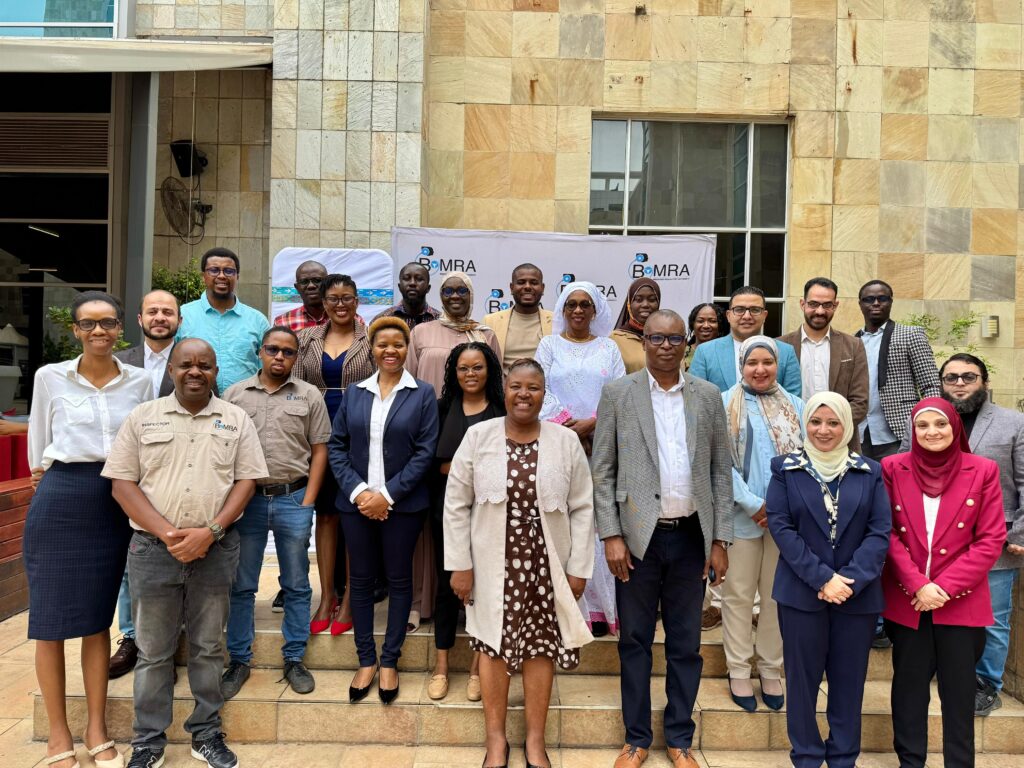Participants at the recently held laboratory twinning program for Botswana, Egypt and Senegal. The program is part of African Medicines Quality Forum, under African Medicines Regulatory Harmonization, courtesy of African Union Development Agency-AUDA-NEPAD.
By Baboloki Semele: A defining moment for Africa’s public health systems unfolded this month as Botswana hosted the third round of the Laboratory Twinning Program from December 9–13, 2024. This initiative, spearheaded by the Botswana Medicines Regulatory Authority (BoMRA) in collaboration with the African Union Development Agency (AUDA-NEPAD), has been hailed as a groundbreaking step toward bolstering vaccine quality control across the continent.
The program, part of the African Medicines Quality Forum (AMQF) under the African Medicines Regulatory Harmonization (AMRH) initiative, underscores Africa’s commitment to building robust healthcare frameworks. Since its establishment in 2017, the AMQF has been a linchpin in improving laboratory capacity and ensuring the post-marketing surveillance of medicines, crucially addressing quality concerns.

Dr. Doaa Rady, Chairperson of the AMQF Vaccines Subcommittee and a distinguished representative of the Egyptian Drug Authority (EDA), provided an impassioned statement at the event:
“The Laboratory Twinning Program is a cornerstone of our efforts to strengthen vaccine quality control across Africa. At the EDA, we are committed to driving sustainable solutions, which is why we are developing a comprehensive training curriculum to be made available to all African countries. Additionally, we are working on a guideline for laboratory infrastructure that will empower member states to establish world-class labs, ensuring accessibility and impact continent-wide.”
This third phase in Botswana follows the program’s successful launches in Cairo, Egypt, and Dakar, Senegal. Each phase builds on the achievements of its predecessor: the Egyptian Drug Authority (EDA) advanced vaccine testing protocols, while Senegal’s Agence de Réglementation Pharmaceutique (ARP) focused on integrating regulatory frameworks. Now, Botswana aims to enhance laboratory infrastructure, integrate Quality Management Systems (QMS) with vaccine lot release processes, and harmonize quality standards continentally.
Dr. Jean Fidele Bationo, AUDA-NEPAD’s Senior Programme Officer, emphasized the significance of this collaborative effort:
“Ensuring the availability of safe, effective, and quality vaccines for all Africans is at the heart of our mission. This twinning program exemplifies how collaboration and knowledge sharing can accelerate progress. By equipping regulatory authorities like BoMRA with the tools and expertise to strengthen vaccine quality control, we are building a healthier future for the continent.”
Botswana Takes Center Stage
For Botswana, hosting this event is more than a logistical achievement—it is a testament to its growing influence in Africa’s health sector. BoMRA’s Manager of Laboratory Services, Lorna Mamvura, expressed pride in the progress made:
“This program has been incredibly beneficial in equipping our team with the knowledge and skills needed to enhance vaccine lot release and quality control. As we improve the quality of our laboratories, we are committed to ensuring that the people of Botswana receive the best quality vaccines.”
The Laboratory Twinning Program in Gaborone featured hands-on training, where participants delved into reliance models for vaccine lot release, strengthened technical competencies in testing, and developed actionable blueprints for intercontinental collaboration. By harmonizing standards, the program addresses disparities in vaccine quality control, ensuring equitable health outcomes across Africa.
A Vision for Africa’s Health
Reflecting on the program’s broader implications, it is impossible not to draw parallels with global efforts to improve healthcare equity. Similar to the pioneering steps taken during the eradication of smallpox or the fight against polio, the Laboratory Twinning Program showcases how cooperation transcends borders, transforming ambitions into reality.
This initiative also aligns seamlessly with Agenda 2063’s vision of an integrated and prosperous Africa. Strengthening vaccine quality control not only safeguards public health but also instills confidence in locally produced medical interventions, reducing dependency on imports.
Looking Ahead
As the third round concludes, Africa stands poised for a future where reliable vaccine quality control systems are no longer an aspiration but a reality. The Laboratory Twinning Program exemplifies how knowledge-sharing, technical training, and regional collaboration can create ripples of progress, touching every corner of the continent.
For Botswana, this event cements its role as a pivotal player in Africa’s healthcare renaissance, setting the stage for continued leadership and innovation. As the curtain falls on this round of the program, the resounding message is clear: Africa’s march toward health sovereignty is unstoppable, and Botswana is proudly leading the way.